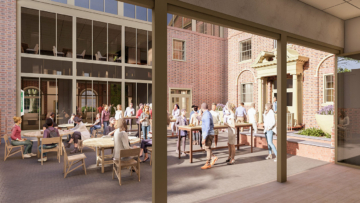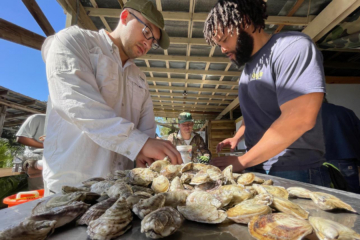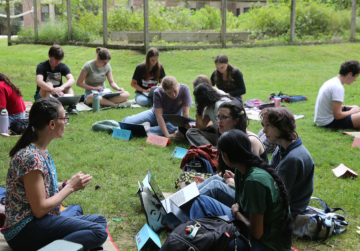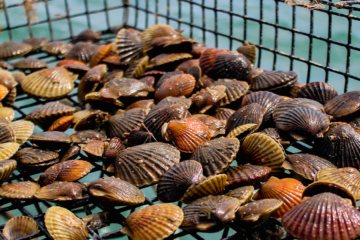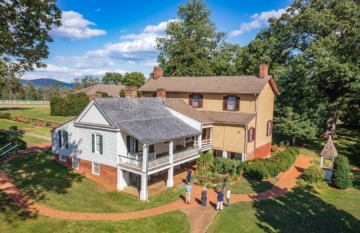William & Mary launches dynamic research incubator following R1 university designation
William & Mary’s Global Research Institute is launching a dynamic new model of high-impact research, positioning the university to leverage its recent R1 research designation.
In GRI’s next chapter, the Institute will operate as a research incubator designed to partner with W&M’s five schools and the College of Arts & Sciences to accelerate faculty ideas from conception to sustainable impact. This incubator addresses critical barriers facing faculty in the early stages of research while creating opportunities for students to engage in meaningful applied research.
Aligned with the strategic direction of the Office of the Provost, the incubator will build on its strong foundation for student-centered applied learning, advancing W&M’s efforts toward national preeminence.
“William & Mary’s elevation to R1 status presents a once-in-a-generation opportunity to redefine how we support breakthrough research,” said Provost Peggy Agouris. “GRI’s next chapter embodies our commitment to fostering the kind of collaborative, student-centered research that will attract top talent from across the nation and establish William & Mary as widely recognized for leadership in addressing global challenges.”
GRI has long been a catalyst for interdisciplinary collaboration, and its partnership with the College of Arts & Sciences has been especially fruitful. Over the years, faculty from Arts & Sciences have launched innovative labs and projects through GRI, and the College has partnered on research support, joint hires, and opportunities for dissemination of research and discovery.
“GRI has been an extraordinary partner, and we are proud to have contributed to their growth through shared initiatives over the years,” said Suzanne Raitt, dean of the College of Arts & Sciences. “This next phase of their journey holds even more promise for our faculty, our students, and the global conversations their work inspires. It will be thrilling to see this next chapter unfold.”
A proven track record, reimagined for greater impact
Over 20 years, research labs at GRI have generated more than $100 million in external funding for William & Mary, engaged thousands of undergraduate students in applied research and pioneered successful spinouts, including research labs that have influenced policy from Capitol Hill to organizations around the globe. The Institute’s alumni now lead major corporations, shape government policy and drive innovation in academia.
“Real-world problems don’t respect disciplinary boundaries, and neither do we,” said GRI Director Mike Tierney ’87, M.A. ’88, P ’15. “GRI’s next chapter scales our approach to serve faculty and students across William & Mary, creating a pipeline that transforms ambitious ideas into sustainable research programs with global impact. This next chapter embodies our vision of teaching through research — where students don’t just learn about research, they collaborate with faculty to create new knowledge that makes a difference in the world.”
Students have been integral to GRI’s research since its origins in 2003, and each new project will continue to include teams of students who receive intensive training in research methods, professional communication and project management. Students gain access to summer fellowships, internship placements with partner organizations and direct connections to GRI’s global network of alumni working in government, nonprofit and private sector leadership roles.

“Being involved in GRI has allowed me to contribute to hands-on research addressing real-world problems and exposed me to practitioners who are leaders in their fields across the globe. These opportunities have shaped my career aspirations, opened doors to my internship opportunities, and fueled my global passions,” said Adelia Purcell ’27, a third-year student studying government at William & Mary.
Tier system accelerates research development
The new GRI incubator operates through four distinct phases:
- Engage (Tier 1) creates cross-cutting programming provided to the entire university community in areas such as research workshops, distinguished visiting experts and professional development training sessions.
- Exploration (Tier 2) provides one-year cohorts for faculty from different disciplines to develop collaborative projects through monthly seminars and networking with practitioners and policymakers.
- Incubation (Tier 3) offers up to three years of intensive support for high-potential projects, including course buyouts for faculty, dedicated student research teams, grant-writing assistance and access to GRI’s extensive network of alumni and partners.
- Transition (Tier 4) ensures successful spinouts move to permanent homes within W&M’s five schools and the College of Arts & Sciences, with two additional years of strategic support to enable sustainability.
“This directly supports William & Mary’s emerging strategic priorities,” said Vice Provost for Research Alyson Wilson. “By breaking down silos and providing structured pathways from idea to implementation, we’re creating the research ecosystem that will solidify William & Mary’s leadership in high-impact areas while providing the best liberal arts and sciences preparation for engaging in complex, interdisciplinary problems.”
Transforming current operations
As part of the transition, current GRI research labs will move to sustainable homes with partners across the university, including the largest of the current labs, AidData.
AidData will become a stand-alone unit that reports directly to the vice provost for research. AidData is a 40-person international development research lab that helps decision-makers — inside and outside of government — design, implement and evaluate policies and investments in ways that improve the well-being of people living in low- and middle-income countries. Its faculty and staff include economists, political and data scientists, policy analysts and media and communication professionals. AidData has particular strengths in artificial intelligence, complex survey research methods and tracking underreported financial flows. It also has substantive expertise in climate change, agriculture, gender equity, migration and foreign policy. Its research, experts and data are in high demand among governments, international organizations and the media.
The transition from GRI to a stand-alone lab will help AidData strengthen its global brand, mobilize additional resources and build more robust cross-campus research partnerships.
“AidData’s core mission and operations will not change,” said AidData Executive Director Brad Parks ’03. “We are transitioning to a new institutional arrangement that will allow our lab to expand its global reach and impact. Our new reporting structure will create opportunities for deeper integration with William & Mary’s broader research enterprise. I am tremendously grateful for Mike Tierney’s vision and consistent support for AidData over the last 15 years. We are looking forward to the next chapter — and working closely with GRI and its affiliated labs.”
AidData and GRI will also continue to be neighbors: The transformation coincides with GRI and AidData’s move to the new Robert M. Gates Hall, purpose-built for collaborative research with modern meeting facilities, computer labs and event spaces designed to foster the interdisciplinary connections that drive breakthrough discoveries.
Ambitious goals, measurable impact
Over the next five years, GRI aims to train more than 200 faculty through thematic research cohorts, incubate over 15 scalable projects, engage 500-plus students in leadership development and applied research and generate more than $20 million in funding through philanthropic gifts and external grants and contracts.
“We’re building a research and applied learning model that other universities will seek to replicate,” Tierney said. “This approach reflects William & Mary’s commitment to ensuring our students don’t just learn about global challenges — they acquire the tools to help solve them. When you have high expectations and treat students as partners rather than assistants, they are empowered to produce work that influences policy and launch careers that change the world.”
In the Global Research Institute’s Summer Fellows Program, a group of students spent six weeks in Bogotá, Colombia, conducting hands-on research on reconciliation efforts, exploring the Amazon, and gaining career-shaping experiences.
Applications for the first cohorts will open in early spring 2026, with the full program planned to launch in summer 2026.



